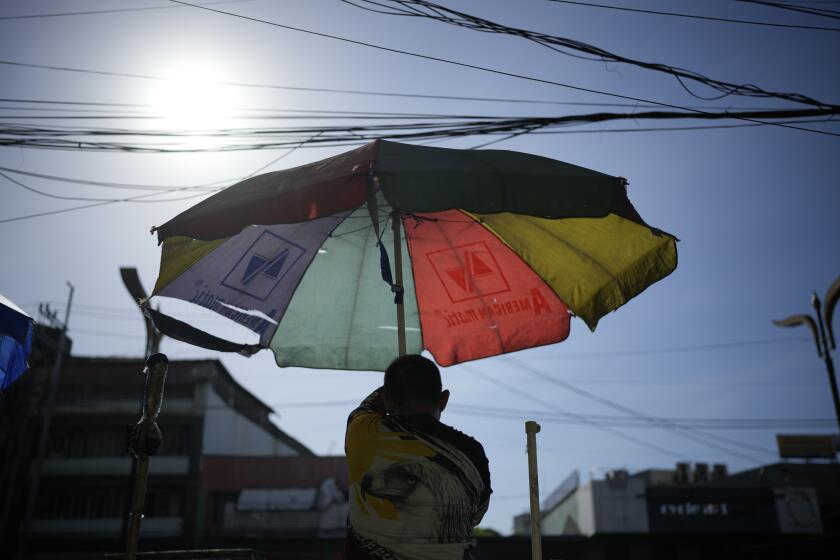Leave ’89 Massacre to History, Jiang Says : Summit: China’s president urges world not to pass judgment on infamous Tian An Men Square crackdown.
A stiff but confident Chinese President Jiang Zemin held a rare news conference Saturday night to tell the world that four years have passed since the Beijing massacre and that judgments about China’s 1989 turmoil should best be left to “history.”
“It is not an easy job to manage a country of 1.17 billion people,” the Chinese president admonished his American audience at the conclusion of the Asia-Pacific Economic Cooperation forum here.
Since 1989, “the livelihood of the (Chinese) people has constantly improved,” Jiang said, minimizing problems such as corruption inside his country. Corruption is “a long-term and historical phenomenon in the world,” which, he said, his Chinese Communist Party is now trying to combat.
Jiang also sought to dispel Asian fears of Beijing’s military buildup and its intentions in the region. “All of China’s defense undertakings are for the purpose of defending Chinese territory,” he declared. “We have no other intentions.”
Jiang is the designated successor to China’s paramount leader, Deng Xiaoping. His trip to the meeting in Seattle, made at President Clinton’s invitation, came at a particularly sensitive time for China.
Deng, 89, is now in such failing health that he no longer appears in public or takes part in leadership meetings. Many foreign diplomats and intelligence officials believe he is near death.
At the same time, China’s relations with the United States seem to be at a particularly touchy stage, with the Clinton Administration pressing Beijing for human rights improvements and some military officials in both countries viewing one another as potential enemies.
Jiang, who had given no ground on human rights in his face-to-face meeting with Clinton on Friday, emphasized at Saturday night’s news conference that he himself does not consider the United States to be an adversary.
He said he had told Clinton that “if I (had) such a view, why should I come to the United States and have such a friendly talk with him?” Jiang acknowledged that China just signed a defense agreement with Russia, but he stressed that this “involves exchanges. It does not involve weapons.”
When asked about China’s steadily growing military budget, he countered that America’s is much bigger.
“China’s military expenditures are very small,” Jiang said. “The total expense is $7 billion. The figure for the United States is $260 billion. . . . There is a big gap.”
Many Western defense specialists believe China’s defense budget is much larger than $7 billion, because other parts of its budget include spending that most countries put in their military budgets.
Jiang parried U.S. complaints about Chinese weapons proliferation by pairing them with Chinese complaints about American arms sales, particularly the George Bush Administration’s decision in 1992 to sell F-16 warplanes to Taiwan. He said Washington and Beijing should begin detailed talks soon to work out these disputes.
On China’s relations with Taiwan, Jiang was particularly tough. “One thing must be made clear,” he told a reporter from Taiwan, which has operated under its own Nationalist government since 1949. “Taiwan is a province of the People’s Republic of China.”
Before joining China’s top leadership ranks, Jiang had served as a Cabinet minister and then as mayor of Shanghai. He was serving there in June, 1989, when Chinese troops were called into Beijing to remove pro-democracy demonstrators from Tian An Men Square.
By Western estimates, at least 1,000 people were killed during that crackdown, and Clinton reminded Jiang at their meeting Friday that some of the leaders or organizers of those demonstrations are still being held in jail as “counterrevolutionaries.”
Within only a few weeks after the massacre, Deng and other elderly party leaders plucked Jiang from Shanghai and installed him as Communist Party secretary. His predecessor, Zhao Ziyang, had been put under house arrest after sympathizing with the demonstrators. At the time, Jiang’s main virtue to the party elders seemed to be that he had no connection to the political turmoil in Beijing.
Jiang now holds a startling array of titles--president of China, general secretary of the Chinese Communist Party and chairman of the Central Military Commission.
More to Read
Start your day right
Sign up for Essential California for news, features and recommendations from the L.A. Times and beyond in your inbox six days a week.
You may occasionally receive promotional content from the Los Angeles Times.






